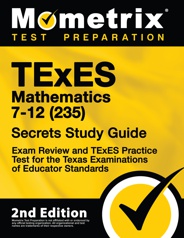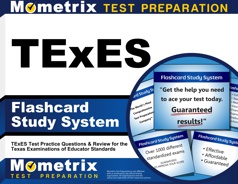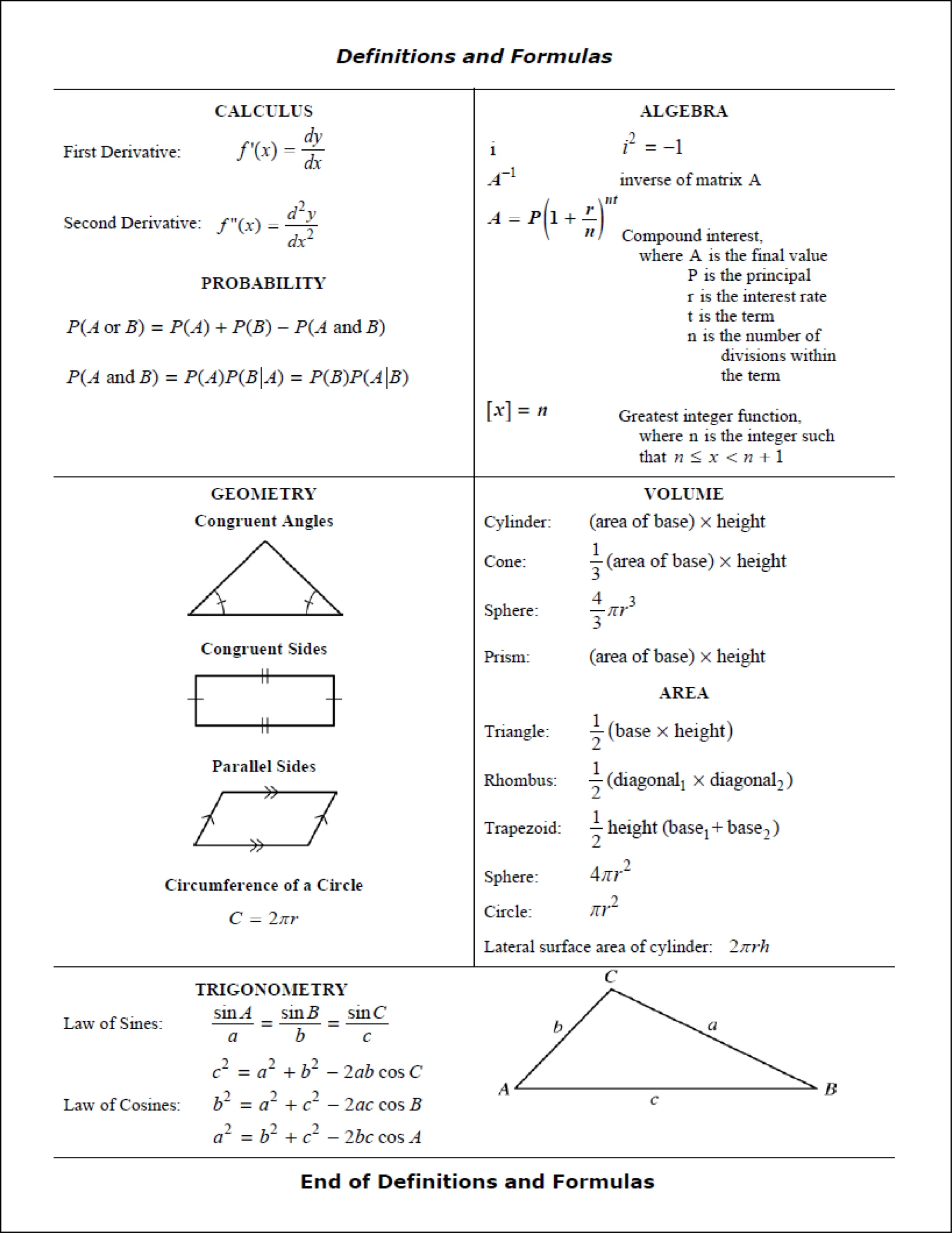The TExES Mathematics 7-12 (235) exam is administered for those interested in becoming an entry-level educator within the Texas public school system, specifically for teaching math to students from 7th to 12th grade.
Click “Start Test” above to take a free TExES Mathematics 7-12 practice test!
TExES Mathematics 7-12 Exam Outline
The TExES Mathematics 7-12 exam contains 100 selected-response questions and has a time limit of 4 hours and 45 minutes.
The exam is split into six content domains, and the questions in each domain fall under one or more assessment standards.
I. Number Concepts (16%)
The questions in this domain fall under Mathematics Standard I:
You are expected to understand and correctly use numbers, number systems and their structure, operations and algorithms, quantitative reasoning, and technology to teach the statewide curriculum to prepare students to use mathematics.
These are the specific topics covered in this domain:
- The structure of number systems
- The relationship between quantity and symbolic representations
- Number operations
- Computational algorithms
- Number theory
- Modeling and solving problems using numbers
II. Patterns and Algebra (21%)
The questions in this domain fall under Mathematics Standard II:
You are expected to understand and correctly use patterns, relations, functions, algebraic reasoning, analysis, and technology to teach the statewide curriculum to prepare students to use mathematics.
These are the specific topics covered in this domain:
- Identification and analysis of patterns using mathematical reasoning
- Relationships among equations, inequations, variables, functions, relations, and expressions
- Linear functions
- Nonlinear functions
- Conceptual foundations of calculus
III. Geometry and Measurement (21%)
The questions in this domain fall under Mathematics Standard III:
You are expected to understand and correctly use geometry, spatial reasoning, measurement concepts and principles, and technology to prepare students to use mathematics.
These are the specific topics covered in this domain:
- The process of measurement
- Axiomatic structure of Euclidean geometry
- Geometric relationships
- Properties of two- and three-dimensional figures
- Transformational geometry
- Relating algebra to geometry and trigonometry
IV. Probability and Statistics (16%)
The questions in this domain fall under Mathematics Standard IV:
You are expected to understand and correctly use probability and statistics, their applications, and technology to prepare students to use mathematics.
These are the specific topics covered in this domain:
- Exploring data using numerical and graphical techniques
- Characterizing patterns
- Describing departures from patterns
- Theory of probability
- Sampling
- Statistical interference
V. Mathematical Processes and Perspectives (10%)
The questions in this domain fall under Mathematics Standards V and VI:
You are expected to understand and correctly use mathematical processes to reason mathematically, solve mathematical problems, make mathematical connections within and outside of mathematics, and communicate mathematically.
Standard VI: Mathematical Perspectives
You are expected to understand the historical development of mathematical ideas, the relationship between society and mathematics, the structure of mathematics, and the evolving nature of mathematics and mathematical knowledge.
These are the specific topics covered in this domain:
- Mathematical reasoning
- Problem-solving
- Mathematical connections
- Communicating mathematical concepts and ideas
VI. Mathematical Learning, Instruction, and Assessment (16%)
The questions in this domain fall under Mathematics Standards VII and VIII:
You are expected to understand how children learn and develop mathematical skills, procedures, and concepts; know typical errors students make; and use this knowledge to plan, organize and implement instruction to meet curriculum goals and to teach all students to understand and use mathematics.
Standard VIII: Mathematical Assessment
You are expected to understand assessment and use a variety of formal and informal assessment techniques appropriate to the learner on an ongoing basis to monitor and guide instruction and to evaluate and report student progress.
These are the specific topics covered in this domain:
- How children learn
- Planning, organizing, and implementing instruction
- Using formal and informal assessments
- Monitoring and guiding mathematics instruction
Reference Materials
You will have access to a list of definitions and formulas during the exam to reference at any time:
Check Out Mometrix's TExES Math 7-12 Study Guide
Get practice questions, video tutorials, and detailed study lessons
Get Your Study Guide
TExES Math 7-12 Registration
To register for the exam, you must create an online NES account via their website. Once your account has been created, you can use it to register for the exam and schedule an exam date.
When you register, you will need to pay the $116 examination fee.
Test Day
On the day of your exam, you should arrive at the testing center about 30 minutes prior to your scheduled exam time. This will leave you enough time to go through the check-in process. After you arrive, you will be asked to present one form of valid, government-issued photo ID.
Once the check-in process is complete, you will be asked to leave all personal items (cell phone, bags, notes, wallet, coat, etc.) in a secure locker outside the testing area or in your car.
After you enter the testing room, you will be given a brief tutorial on the computer-adaptive testing system, and you will be asked to sign an NDA. Once this is complete, the exam will begin.
You are allowed to take a restroom break during the exam, but the timer will not be paused while you are away.
How the Exam is Scored
The TExES Mathematics 7-12 (235) exam is computer-adaptive. Here’s a look at how it works:
The first question is judged to be of medium difficulty, and depending on your performance, the next question may be easier or harder. If you do well on the first question, the second question will be harder; conversely, if you do poorly on the first question, the second question will be easy.
The questions on this exam are rated on a scale of 100-300. The higher a question is rated, the harder the question is (e.g., a question marked as 210 will be more difficult than a question marked 165).
To pass the exam, your final question must be on or above the 240 mark. If your final question is below this mark, you will not pass the exam, even if you have answered some questions above the 240 mark at some point during the exam. This is because the computer has rated the difficulty of your final question based on how you answered the previous questions.
Check Out Mometrix's TExES Flashcards
Get complex subjects broken down into easily understandable concepts
Get Your Flashcards
FAQs
Q
How many questions are on the TExES Mathematics 7-12 exam?
A
There are 100 selected-response questions on the exam.
Q
How long is the TExES Mathematics 7-12 exam?
A
The time limit for the exam is 4 hours and 45 minutes.
Q
What is the passing score for the TExES Mathematics 7-12 exam?
A
To pass the exam, you must achieve a minimum scaled score of 240.
Q
How much does the TExES Mathematics 7-12 exam cost?
A
The examination fee is $116.



